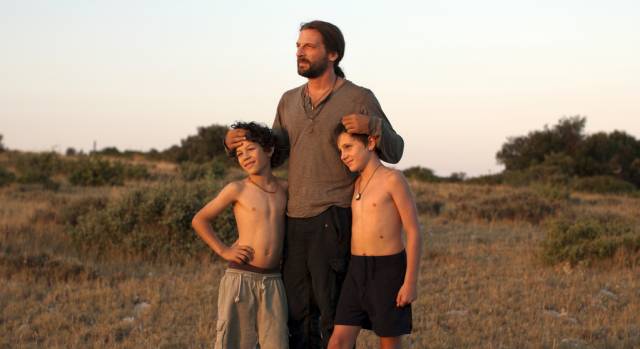
 All children of divorce are caught in the pull of two different poles, but few face a choice as drastic as the children in Wild Life (Vie Sauvage). Based on a true story that played out in the French media, director Cedric Kahn’s film tells the story of Paco (Matthieu Kassovitz) and Nora (Cèline Salette) and their family. When they meet, Paco and Nora are both social outsiders who believe in living more in sync with the rhythms of nature than the demands of mainstream society. Their dream is to raise a family in a natural state; living nomadically, home schooling, and imparting their own chosen values to the children. But the film begins right as the dream has disintegrated – Nora waits until Paco has left for the store and then spirits her children out of their remote home and back into the awaiting arms of society and her bourgeois parents. The children are not told what is going on and undertake the move unwillingly, screaming for the father, but Nora’s conviction wins out and the children’s long hair is soon cut as a symbolic termination of their former life.
All children of divorce are caught in the pull of two different poles, but few face a choice as drastic as the children in Wild Life (Vie Sauvage). Based on a true story that played out in the French media, director Cedric Kahn’s film tells the story of Paco (Matthieu Kassovitz) and Nora (Cèline Salette) and their family. When they meet, Paco and Nora are both social outsiders who believe in living more in sync with the rhythms of nature than the demands of mainstream society. Their dream is to raise a family in a natural state; living nomadically, home schooling, and imparting their own chosen values to the children. But the film begins right as the dream has disintegrated – Nora waits until Paco has left for the store and then spirits her children out of their remote home and back into the awaiting arms of society and her bourgeois parents. The children are not told what is going on and undertake the move unwillingly, screaming for the father, but Nora’s conviction wins out and the children’s long hair is soon cut as a symbolic termination of their former life.
But Nora’s victory is only temporary. Paco spends a year appealing the custody, learning that even though Nora left the family home, French law will almost always award custody to the mother. So instead he simply takes the children, two of whom go with him more than willingly while one stays behind (the two that go are Paco’s natural sons while the one who stays is Nora’s from an earlier relationship). With a lifetime of experience, Paco and his sons fall of the grid easily and he raises them to adulthood in the nomadic way he (and once Nora) intended, while Nora searches for them helplessly.
Kassovitz inhabits his character completely, playing Paco as a man of conviction and gentleness, who resents that he has had to become a criminal to raise his children as he planned. The film essentially shows his side of the story; the mother mostly disappears from the action after the beginning as we see the children grow up under Paco’s care. Kahn probably made this decision because French audiences would be familiar with the mother’s perspective from the media coverage of the case, and he felt it more important to shine light on Paco’s perspective. Some of the film’s most stirring scenes show the benefit of such an unusual childhood, as Paco teaches the boys about nature and they share communal pleasures like dancing around a campfire. But the heartbroken mother is never completely gone from our, or the boys’, consciousness.
The film is structured in two parts, showing the beginning of the family’s decade in the wild, when the children are roughly 7-9 years old, and ten years later, when the boys have become teenagers and started to rebel against Paco’s way of life. The time jump is a little confusing, as it’s hard to know if the film views their teenage rebelliousness as a condemnation of Paco’s methods or a natural outgrowth of their age. All in all, Wild Life is a good, if not great portrayal of a familial and social crisis. There is a remoteness in how Kahn presents the characters that makes the film engaging more intellectually than emotionally, somewhat strange considering the inherent pathos of a mother separated from her children. But Wild Life is perhaps less interested in the specifics of the real story than its societal implications. The film is interested in where parental authority ends and state authority begins, which it explores through one father willing to become an outlaw to raise his children as he sees fit.